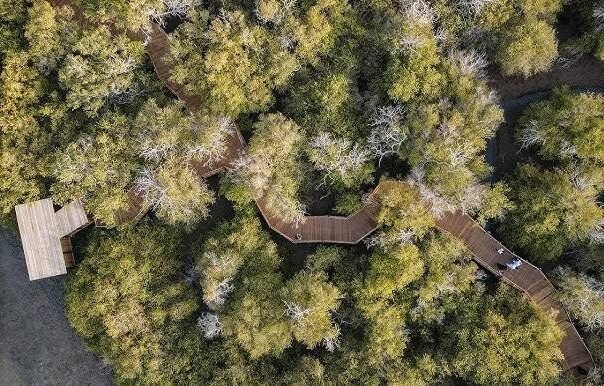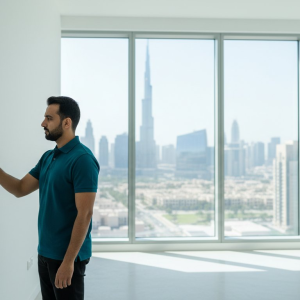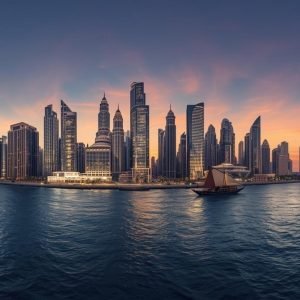Sharjah has taken another significant step toward environmental preservation with the plantation of 11,600 mangrove trees in Khor Kalba. This initiative underscores the emirate’s commitment to sustainable development and conservation of its natural ecosystems, as well as its proactive approach to combating climate change. The project aligns with the UAE’s broader goals of environmental protection and reducing carbon footprints, reinforcing the nation’s global leadership in sustainability.
Khor Kalba: A Haven for Biodiversity
Khor Kalba, located in the eastern region of Sharjah, is one of the oldest and most ecologically significant mangrove ecosystems in the Arabian Gulf. Known for its rich biodiversity, this area is home to several rare and endangered species of flora and fauna, including the Arabian collared kingfisher and the Hawksbill turtle. Mangroves play a vital role in maintaining the ecological balance of this habitat by stabilizing coastlines, filtering pollutants, and acting as a natural barrier against storm surges.
With the planting of these mangroves, Sharjah is not only enhancing the natural beauty of Khor Kalba but also contributing to the protection of its unique biodiversity. The initiative ensures the preservation of this delicate ecosystem for generations to come.


Why Mangroves Matter
Mangrove trees are often referred to as “coastal guardians” due to their critical role in protecting shorelines from erosion and storm damage. Beyond their physical benefits, mangroves are environmental powerhouses. They are highly efficient at absorbing carbon dioxide, storing up to four times more carbon than tropical rainforests. This makes them indispensable in the global fight against climate change.
Additionally, mangroves provide breeding and nursery grounds for marine life, supporting local fishing communities and contributing to food security. By expanding mangrove coverage in Khor Kalba, Sharjah is strengthening both its environmental and economic resilience.

Sharjah’s Commitment to Environmental Sustainability
This plantation initiative is part of Sharjah’s larger vision of promoting sustainability and preserving its natural heritage. Spearheaded by local environmental agencies, the project involved the active participation of community members, volunteers, and environmental organizations, emphasizing the importance of collective action in environmental conservation.
Sheikh Sultan bin Muhammad Al Qasimi, Ruler of Sharjah, has long championed sustainability and biodiversity conservation. Under his leadership, Sharjah has launched several pioneering initiatives to protect its natural environment. These include the establishment of protected areas like the Wasit Wetland Centre, which serves as a sanctuary for migratory birds, and the Mleiha Archaeological Centre, which combines heritage preservation with eco-tourism.
The plantation of 11,600 mangrove trees is yet another milestone in Sharjah’s journey toward achieving its environmental goals. It highlights the emirate’s commitment to meeting the United Nations Sustainable Development Goals (SDGs), particularly Goal 13 (Climate Action) and Goal 15 (Life on Land).
Community Involvement and Awareness
One of the most remarkable aspects of this initiative is the involvement of the local community. The plantation project in Khor Kalba brought together government officials, environmentalists, schoolchildren, and volunteers, all working toward a common goal of environmental preservation.
Educational campaigns were also launched to raise awareness about the importance of mangroves and their role in combating climate change. These programs aimed to instill a sense of responsibility among residents, encouraging them to take an active role in protecting their environment.
The project not only resulted in the plantation of mangrove trees but also created a platform for dialogue on sustainability and conservation. It emphasized the need for collective action and long-term commitment to preserving the planet’s natural resources.
Impact on Climate Action
Sharjah’s mangrove plantation initiative has far-reaching implications for climate action. Mangroves are among the most effective natural tools for mitigating the impacts of climate change. By planting 11,600 mangroves, Sharjah has significantly increased its carbon sequestration capacity, contributing to global efforts to reduce greenhouse gas emissions.
Moreover, mangroves act as natural water filters, improving water quality in the region and supporting marine life. They also provide a habitat for numerous species, enhancing biodiversity and strengthening the resilience of coastal ecosystems against the adverse effects of climate change.
This initiative is a clear demonstration of how local actions can have a global impact. By prioritizing sustainability, Sharjah is setting an example for other cities and countries to follow, proving that environmental conservation and development can go hand in hand.
A Model for Sustainable Development
Sharjah’s efforts in Khor Kalba align closely with the UAE’s broader vision for sustainability. The UAE has long been a leader in environmental innovation, with initiatives like the Abu Dhabi Mangrove Programme, which aims to plant millions of mangroves across the country.
The plantation project in Khor Kalba serves as a model for sustainable development, showcasing how targeted initiatives can address pressing environmental challenges while also engaging local communities. It demonstrates the potential of public-private partnerships, innovation, and education in driving sustainable progress.
Future Plans and Expansion
The success of the mangrove plantation initiative in Khor Kalba is likely to pave the way for similar projects in other parts of Sharjah and the UAE. Environmental authorities are exploring the possibility of expanding mangrove coverage in other coastal areas, further enhancing the country’s resilience to climate change.
Plans are also underway to monitor the growth and health of the newly planted mangroves using advanced technologies, such as drone mapping and satellite imagery. These tools will provide valuable data on the impact of the project and help guide future conservation efforts.
Sharjah’s commitment to sustainability doesn’t stop with mangroves. The emirate is investing in renewable energy, waste management, and eco-tourism, aiming to create a holistic approach to environmental conservation. By integrating these efforts, Sharjah is building a sustainable future that balances economic development with ecological preservation.
Conclusion: A Greener Tomorrow
The plantation of 11,600 mangrove trees in Khor Kalba is a testament to Sharjah’s unwavering commitment to sustainability and environmental stewardship. This initiative not only enhances the emirate’s natural beauty but also contributes to global efforts to combat climate change and protect biodiversity.
Sharjah’s actions serve as an inspiration for communities and nations worldwide, highlighting the power of collective effort in preserving our planet. As the UAE continues to lead by example in sustainability, initiatives like this demonstrate that a greener, more sustainable future is within reach.
By prioritizing the environment and empowering its citizens, Sharjah is ensuring that future generations inherit a world that is not only livable but thriving. The mangroves of Khor Kalba stand as a symbol of hope and resilience, reminding us all of the importance of protecting the natural world.
Do follow Uae stories for more Updates
TP-Link UAE: Celebrating Excellence and Innovation in the Tech Industry












